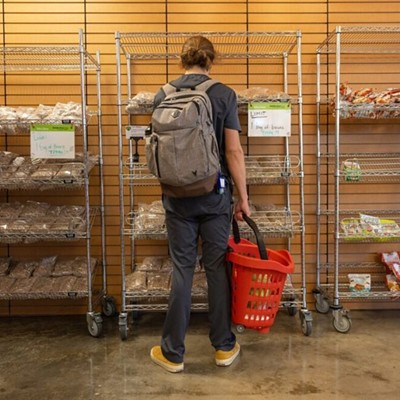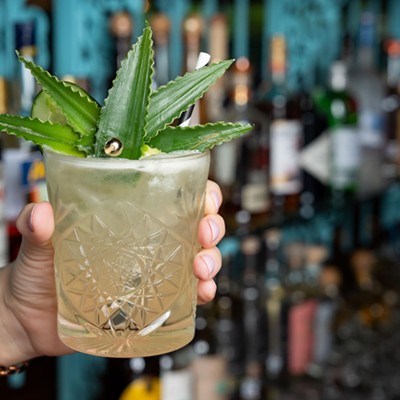Brandi Key Coppa Ristorante Italiano 5555 Washington Tel: 713-426-4260
This is Part 2 of a three-part Chef Chat series. You can read Part 1 here and Part 3 in this same space Friday.
EOW: So the concept of Coppa as being an Italian restaurant, and you coming from Pappas, how did that evolve and why Italian?
BK: I'm kind of one of those people who can morph into what I need to do? I did that at Pappas, I learned how to do it at Pappas, because I did work with Pappasito's, Yia Yia Mary's and Seafood House, and I got to see a lot of different food. But the reason I came here, when I found out that they were going to switch it over, and I found out they weren't going to keep it as Catalan, that's when it really interested me. Catalan was Chris [Shepherd], and that was awesome, and the fact that they were going to take the space and do something completely new very much interested me. And when they said they wanted to do Italian -- that's when I knew that I had to go talk to these guys.
EOW: Really?
BK: Because the type of food that I've always wanted to do and that interested me the most is all based on the Mediterranean. So when I first decided and knew that I was ready to start looking for a place -- it was time to take the step and leave Pappas and do my own thing -- I actually sat down with a piece of paper and a pen, and made a wish list. And that wish list was mainly about ingredients. If I could stock a kitchen with everything that I loved to cook with, what would it be? So I made a list, and because I'm a geek, I cross-referenced that with where these things come from. And it turned out that everything on the list, if the country touched the Mediterranean ocean -- it was from there.
EOW: So what was on the list? Tomatoes...
BK: Tomatoes, eggplants, peppers, lemons, oranges, chilies, figs, prosciutto, honey. So once I knew what really I wanted to cook with and the things that I liked, I started researching countries. I wrote papers for myself about Italy, about France, about Spain, Morocco, the cuisine in Israel, Turkey. Just trying to really understand how these people eat and why they eat what they eat and where it comes from. And so, when I knew that this place was going to be Italian, it was easy, because I already knew that I could morph into Italian food.
But my biggest thing was really just being able to make stuff by hand. I wanted a place where the heart and soul was about making stuff by hand. Like we make pizza dough every day, and it's a process that I love and it's a process I'm a part of, because there's nothing more fascinating than water, yeast and flour.
EOW: Okay...(laughs)
BK: It's so simple, I mean, think about it. It's three ingredients, and it makes us something that we debate about, that we talk about, that we all gotta be like, "Who's got the best pizza in town?" And it's flour, water and salt, and yeast. And to me that's fascinating. Just the simple thing of pasta. Being able to make that with your hand every day. We make eight different pastas every day. And being able to see that again, flour and egg, or flour and water. Being able to make come together and being able to make something that people get so jazzed up about, to me, it's the best thing in the world. I love it.
EOW: So what are the things that you're most proud of, because this menu is all you?
BK: Definitely the pizza. 100 percent. When we started this thing, the one thing that Grant said to me, and I'll never forget it, because we were sitting right over at table 13 when it was still Catalan. He was sitting across from me, and he looked right at me, pointed his finger at me and he was like, "The pizza has to be awesome. The crust has to be perfect." And I was like, "Yes, sir." And we were able to make a pizza the way that we like to eat it. It is inspired by Neapolitan. It is not Neapolitan pizza.
EOW: So what does it take --these three ingredients -- what does it take to get that magic formula, because the weather here is a little wonky, right?
BK: The weather here is wonky. So it is really about hydrating flour and understanding how much water you need.
EOW: So have you had to modify based on the weather?
BK: We've had to make small ones. And it's really only two times I had to do it. It was when we got really, really hot last year that it started acting weird, and I kind of had to make a little adjustment. Obviously, when we get really rainy weather and it gets really humid, we have to treat it a little bit different.
EOW: What does that do to the dough?
BK: It doesn't do so much to the dough as it does to us managing the dough. It's more of us knowing the temperature in the water when it comes out the tap in the summer is really hot, and making sure it's the right temperature when it goes in. There's using the right water, using the right salt, using the right yeast. And because I got to start from ground one, for me, it was doing a lot of math, a lot of doing baker's percentages.
But until I got the pizza oven, I wasn't really able to make a dough until I got the oven. Because what people will do is, they'll make a recipe for pizza dough, then they get an oven, and the oven has just as much to do with the pizza as the dough itself. The way it cooks, how hot it gets, it really dictates how you make it. Our oven has the potential to get to 900 degrees, but for our pizzas we don't actually cook it that hot. It was about deciding the right temperature and the right hydration to give me crisp on the bottom but chewy on the crust. I wanted both worlds. I didn't want just thin crust crispy and just the Neapolitan chewy. I tried to do something to put both in one. It's the way I like it, the way Grant likes it, it's a little selfish indulgence, but it makes our pizza what it is. We cook our pizzas from 650-700 degrees.
EOW: And how long does it take?
BK: Our pizzas take about two and a half to three minutes to cook. So traditionally if you're doing Neapolitan, you're gonna cook it at about 1000 degrees, and you're gonna cook it for 90 seconds. That's the standard, right? And it gives you something really chewy and I love it.
width="1500" height="997" /> EOW: But it hardens very quickly.
BK: It does. As it cools, as it sets, it tends to change character. What's cool about ours, about cooking it a little longer, is that everything really gets set, and so the bottom holds the fillings well. We try not to overfill anything. Our goal is for you to be able to pick up the pizza. We want it to be able to sit up and hold itself, and you actually want you to eat the crust. So our dough's got a fair amount of salt, so you get to the end, it's crunchy and crispy and chewy and salty, and you want to stick it in the meatball sauce...
EOW: I'm totally sold. I've had it and from day one it was good.
BK: And I would say it's gotten better and better. Our guys that build the pizza have gotten better at understanding how the dough feels. Sometimes it needs to be worked and sometimes it doesn't. It's living, and you gotta work with it.
EOW: Going to the new Coppa. How did it come about?
BK: We were basically approached -- a regular of the restaurant who happens to be in the building business -- we were one of the people that they really wanted to fill their retail space with. And we've been wanting to open another Coppa since we opened this one. We just feel like it's the right model to put in a couple of different places. For instance, this is Coppa Ristorante, and we're looking to have the one in Rice Village be Coppa Osteria, more of a neighborhood-type restaurant.
EOW: Is it going to be smaller?
BK: It's not smaller, but it'll be a different layout. One of the cool things about this next kitchen is I'm actually going to have two pizza ovens. So instead of the one that I have now, we'll have two on the line. With that whole neighborhood fare being a little more -- not casual and not rustic -- but a little more step-down, if that makes sense, I want to do a lot of things as far as our proteins out of a pizza oven.
EOW: Why, wouldn't it be worse?
BK: No. We do so much with our pizza oven right now that people don't even know about.
EOW: Like?
BK: Sardines. We take really beautiful sardines that I get from the Mediterranean, and we spread it with golden raisin mostardo, we roll 'em up and we pick, we put them in a little casuela with caper berries and bread crumbs, and we throw the whole lot into the pizza oven, and it just makes the skin on the sardines get crisp; the whole thing is just piping hot, and the caper berries get blister -- it wouldn't be as good as it is if it wasn't coming out of the pizza oven.
EOW: So the menu at the new restaurant is not going to be exactly the same as here?
BK: It's going to be almost the same. There's certain key elements that I want to keep here, so people will know when they come to Coppa Ristorante that they're only going to get it here. It's going to be about 85 to 90 percent the same.
EOW: So this is really an exciting time for you. So you're exciting chef, you're opening a new one. What do you see for the future?
BK: I would like to have multiple Coppas open, and other restaurants that I am kind of the culinary -- I don't even know what to call it -- but basically be the person who gets these places open, and having well-thought-out concepts in food. And being able to have multiple restaurants to be over and oversee.
EOW: When Coppa came into being, was it your idea to have it be repeatable at the get-go?
BK: Not necessarily. I think Grant had that vision, for sure.
EOW: Because the question would be, why didn't you replicate Ibiza? Why didn't you replicate Brasserie 19?
BK: And honestly, both of those concepts are fair game. It's all about being in the right place. Putting a Brasserie 19 in Dallas makes sense. Putting a Coppa in Austin makes sense. They can all be replicated. One of the things I learned being at Pappas-- we had all these concepts under one umbrella. At one point I had 35 restaurants I was travelling to and taking care of. And being able to travel as much as I have, and just learn this business for the last 14 to 15 years, when we got going, and we got open, it was about three months in, I was like, "Oh, yeah, this can go places."
Check back with us tomorrow as we taste some of Key's food.
Follow Eating Our Words on Facebook and on Twitter @EatingOurWords






